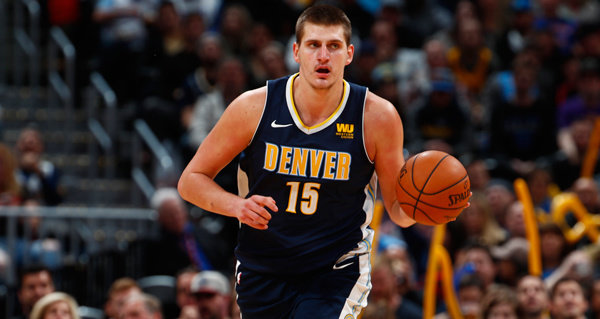Coming off an All-NBA first team selection and a sublime playoff run that brought his Denver Nuggets within a game of the Western Conference Finals, Nikola Jokic showed up to training camp in September looking like a seven-foot mayonnaise sculpture that had spent an afternoon in the sun. If he arrived a bit huskier than usual, no one minded; he was the Curvy Wife of the mainstream NBA fan, and these were Ten Pounds I Like And Don’t Like. Of course, as far as true aficionados were concerned, Big Honey was in the best shape of his life — stalwart, virile, and ready to dominate.
Through twenty games, though, Jokic has been slow and bad. His lowlight reel of shots getting stuffed and passes airmailed out of bounds shows a body that has not caught up to his mind, if not a mind slowing down to that body’s speed limit. He’s scoring just 16 points per game on 45% shooting, 23% from three, numbers Julius Randle can get you in the bloated modern game — except he’s getting to the line less than Randle. “Right now I’m struggling, so coach, he’s a smart guy, he’s not going to give the ball to the guy who’s not making shots,” Jokic admitted last week.
His egglaying has not prevented the Nuggets from winning games overall — in fact, their record is better now than it was this time last year — but it’s been noticeable, which is to say that people are complaining about it. Nate Silver, either an expensive machine that can read a box score or operating one, tweeted his concern. Zach Lowe, a normativity and aesthetics compass for a stunning breadth of NBA fans, recited some numbers before pointing out that Joker is pouting more. Paul Pierce, who I thought didn’t have this job anymore, blamed it on the 24-year-old’s weight, opining even more emptily that the Nuggets aren’t contenders unless Jokic is a top-5 player.
Shaquille O’Neal used to trigger columnists by showing up to camp at 365 pounds or missing the first quarter of the season with a toe issue because he delayed getting treatment. But Shaq understood that his seasons were longer, so he took it easy in the early going and won four titles as a result. Since then, the practice of stars sitting whole games during the regular season has become so commonplace that the league recently established guidelines in order to keep advertisers happy. Somehow this general downplaying of non-playoff basketball, whether reflected in falling ratings or not, does not preclude fans or media from picking apart Jokic’s performance in a November game against the Lakers.
Indeed, Jokic’s scenic route to virtuosity is the price, nay, the reward of seeing him every night. Only a truly insane person could be mad about load management and wag a finger about Jokic playing his way into shape at .25x speed. How did people remember him anyway, as a Basketball Reference page? It’s Nikola Jokic, the mouth-breathing pudge lord who runs like the sixth grade’s class goalie on the last leg of a suicide in P.E. Expecting the abominable snowman out of the gate isn’t just expecting a different player, it’s expecting another person entirely.
It’s not hard to read the slump as Jokic pacing himself, if unconsciously. Better, though, to see these doldrums as part of the charm, another dimension of an already uniquely, yes, well-rounded NBA star. Among other things that distinguish Jokic from his maxed-out peers is he doesn’t think he’s that good. Nuggets coach Mike Malone recalled that during his revelatory 2017-18 season, Jokic “would say, ‘I don’t think I’m as good as this guy or that guy,’ and I’d look at him like, ‘Are you crazy?’” Where another player would look at this year’s stat sheet and insist that the shots are there and just not falling, that they will eventually, and this kind of thing just happens, Jokic admitted to being out of sorts.
A rough start doesn’t validate his belief that he’s not one of the best, but after a run like he had — notching playoff averages only previously recorded by Oscar Robertson — they show why anyone could still get it twisted: because when the over-the-shoulder lobs and the quarter-speed drives to the hoop return, he won’t look any different. This bout of late-autumn clumsiness is not a bug of Nikola Jokic’s game, or a feature, but the feature, the aspect that brings his genius into sharpest focus. He’ll work out the kinks — inevitably, obviously. Or he won’t! Who knows? It’s possible that there is no staying the course for him, that the thought of a course has never occurred to him at all.
In the meantime, producing like Julius Randle does generate one positive externality. For a basketball butterfly who piqued Buffstreams hipsters and Dunc’d On listeners and No Hat Boys alike, the recent slander has amounted to a player-haters’ roll call of unprecedented scope. Every subpar start simply threshes his legion of fake devotees further, restores more of this great escaped wonder to its original Hellman’s bottle. Big Honey does not keep receipts, and the next time he plays 65 minutes in a second-round playoff game, no one will bring up his fitness back in November. By then, he’ll be in the best shape of his life, as he will have been all along.
- Louis Keene is the creator of Unstatable, a newsletter about the 2019-20 LA Clippers.




